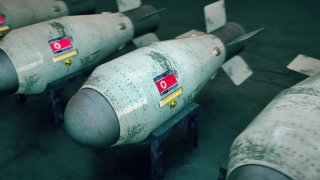Harris' North Korea Policy Should Focus on What Is Achievable
Achievable goals for U.S. policy are to minimize the risk of violence, reduce the flow of money to Kim, primarily by cutting the effectiveness of North Korean cybercrime, keeping the DPRK on the lists of topics where finding common understandings with China remains useful, and developing a common position for containment and restraint with allies.
While Kim Jong-un appears to have abandoned the ambitions of his grandfather to unify the Korean Peninsula, his interests seem relatively clear. The first is to preserve his control over the North (and protect Kim family rule). The second is to continue to acquire wealth, despite an array of United Nations (UN) sanctions, often using illicit methods. Chief among these is cybercrime, which makes an astounding contribution to North Korean gross domestic product.
Given this, there is little room for diplomacy. Kim has enough nuclear weapons and delivery systems to feel confident that neither the Republic of Korea (ROK) nor the United States will use force against him. His internal security methods eliminate internal threats, and he is reasonably skilled in ensuring that Russia and China remain supportive.
Russia’s misadventure in Ukraine means it will not press the Democratic People’s Republic of Korea (DPRK) for change. China, whose tolerance if not assent is crucial for diplomatic progress, is most interested in assuring that the DPRK remains in existence, to avoid a unified and more powerful Korea and a distraction for the United States. This outweighs other considerations. China is at times frustrated with the DPRK and Kim but not frustrated enough to change course.
This unpromising landscape sets the parameters for American policy. It means the United States would be the demander, asking Kim for changes that do not serve his interests with very little to offer in return. Perhaps some extreme crisis could change this, but his regime routinely ignores poverty, exceptional famine, and international opprobrium.
Why would Kim give up Weapons of Mass Destruction?
The examples of Libya and Iraq show this to be an unwise course for dictators. A closer economic partnership with the ROK was also rejected. Engaging with the North will have limited returns.
One option for American policy has been largely foreclosed, no one talks of regime change nor would our allies support it. The greatest risk for Kim comes from his population recognizing the accomplishments of the ROK, and while he has managed to restrict access to this knowledge, its slow, corrosive effect remains.
However, an American policy to slowly undermine Kim would require the support of the ROK and has not been attempted in decades. More sanctions are pointless.
Better enforcement of existing sanctions would squeeze the regime, but to what end? Kim will not give up his weapons of mass destruction (WMD), nor does he appear interested in economic cooperation.
Some problems defy resolution, and North Korea is one. Achievable goals for U.S. policy are to minimize the risk of violence, reduce the flow of money to Kim, primarily by cutting the effectiveness of North Korean cybercrime, keeping the DPRK on the lists of topics where finding common understandings with China remains useful, and developing a common position for containment and restraint with allies.
Deference should be given to ROK interests and positions since it would bear the brunt of miscalculation. New American presidential administrations often like to show initiative, and while the North will accept any gifts, the fundamentals will not change.
Cybercrime, a pillar of the DPRK economy, may be one area where there is room for some American action with allies and partners. North Korea makes billions from hacking and is expanding its efforts. This administration’s Counter Ransomware Initiative (CRI) has broad support, with more than seventy nations participating, since countries that are unwilling to join the United States in actions against those we see as opponents are willing to work collectively against cybercrime.
Reducing income from crime will not bring the North to the table but it will slow the development of WMD by denying resources and perhaps pressing Kim.
This may not be the most dramatic initiative and it provides a limited scope for a new policy, but in combination with other constraining policies, it offers the greatest chance of affecting the North and producing a change in its behavior.
About the Author
James A. Lewis is a Senior Vice President at CSIS. Before joining CSIS, he was a diplomat and a member of the Senior Executive Service. Lewis has a track record of being among the first to identify new tech and security issues and devise policies to address them. He developed groundbreaking policies on cybersecurity, remote sensing, encryption, spectrum management, and high-tech exports to China, including 5G, software, and semiconductors. He also helped create the Wassenaar Arrangement. Lewis was a senior adviser for four UN Groups of Governmental Experts on Information Security, and his work on norms to build stability in cyberspace is foundational. He leads a long-running Track 2 dialogue with the China Institutes of Contemporary International Relations. His current work looks at how countries innovate and at digitalization and its political, economic, and security effects. Early in his career, Lewis was a political adviser to two combatant commanders.
Image Credit: Creative Commons and/or Shutterstock.


